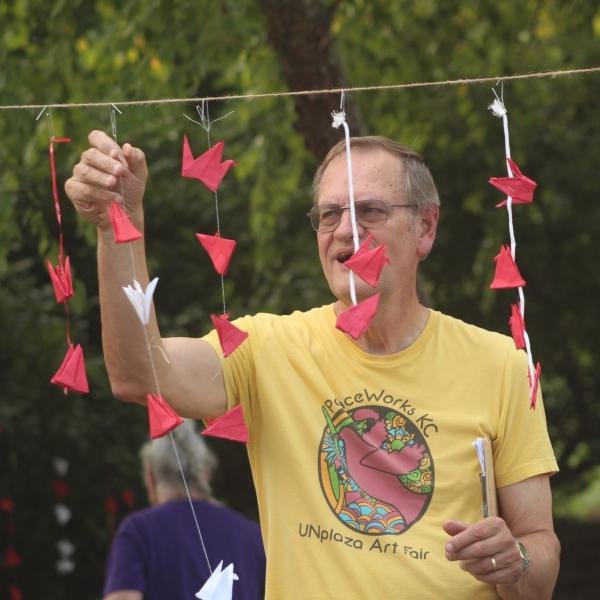
By Kimmy Igla
In a powerful gathering, a coalition of Midwest organizers convened for a strategic forum titled “At the Center of the Arms Chase: Honeywell, Kansas City, & Resistance.” We focused on the urgent threat of nuclear weapons and the local impact of the arms industry, and highlighted the reliance on Midwest workers’ complicity in war crimes. The event blended stark education with forward-looking strategy, culminating in a series of breakout sessions aimed at building a powerful grassroots movement, inspired by other campaigns.
The forum opened with a Nuclear News Roundup from Mitch Schiller and Kamran Choudhry, members of the Party for Socialism and Liberation (PSL). They set a sobering tone by highlighting recent announcements from Trump online concerning resumed nuclear testing. They also provided more context to the American Empire’s nagging nuclear threats to other sovereign nations.

This contemporary threat was immediately connected to its historical human cost by Bree Crawford of PeaceWorks, who provided a poignant overview of the devastating health and environmental impacts of decades of nuclear testing on communities. The US government’s legacy of testing nuclear technology on human beings has only had devastating health impacts. Further testing is not necessary, and is only a tool of terror and threat to other countries.
As a member of Physicians for Social Responsibility KC, I drove home the local connection, detailing the ongoing operations of the Honeywell Plant, tracing a direct line from its role in producing nuclear components to the severe health consequences for workers and the surrounding environment, framing it as a persistent public health crisis. I detailed how nuclear sites across the country are connected, and how the “government-owned, contractor-operated” system works within the weapons industry. “Cost-effective contracting” came at the cost of public safety in the hands of Honeywell. The corporation that primarily profits from household technology manufacturing (like fans, thermostats, etc.) are responsible for thousands of deaths at the Bannister Federal Complex before upgrading facilities in 2014. Workers were not informed they were handling known toxic substances like lead, beryllium and Trichloroethylene (TCE), and no personal protection equipment like gloves or masks was provided. The new facility plays a vital role in the nuclear weapons manufacturing process. Without the KCNSC, the nuclear weapons complex would grind to a halt.
The scope of the forum then expanded with a hard data report from Chris Overfelt of KC’s Vets for Peace. He presented a detailed overview of the Midwest’s specific role in the weapons industry, identifying key manufacturers and supply chains that make the region a critical hub for the war machine. His report is at https://peaceworkskc.org/midwest-weapons-report-nov-2025/. Finally, representatives from PSL introduced the concept of a “People’s Arms Embargo,” showcasing successful international campaign examples where public pressure has been used to block weapons shipments and hold manufacturers accountable, like the “Mask Off Maersk Campaign” organized by the Palestinian Youth Movement. Maersk was forced to halt shipments of weapons to the Zionist occupation in Palestine due to a sustained public pressure campaign over 2 months.
Following these presentations, attendees broke into small, facilitated discussion groups to translate this information into action. The groups grappled with three core strategic questions:
1. What is our role in disarming the arms manufacturers?
2. What tactics can we employ for a people’s arms embargo?
3. How can we keep the struggle for a nuclear-free world alive?

Conversations emphasized the need to bridge generational gaps, center the stories of impacted communities, and connect the nuclear issue to other social justice struggles, from climate change to economic inequality. Ideas ranged from community education and worker solidarity to targeted boycotts of parent companies and digital campaigns that expose supply chains.
The forum concluded with a shared sense of resolve.
By linking the global nuclear threat to the local factory floor and arming participants with both historical context and modern campaign tools, the event succeeded in creating revolutionary optimism, and the will to know what must be done. Participants left with a clearer, collective vision for building a peaceful and nuclear-free future.
What would it look like for an organized campaign to kick Honeywell out of Kansas City for good? Time will tell.
–Kimmy Igla, representing the KC chapter of Physicians for Social Responsibility, is a former PeaceWorks KC Board member. © 2025, Kimmy Igla, Creative Commons Attribution Share-Alike 4.0 International License.

